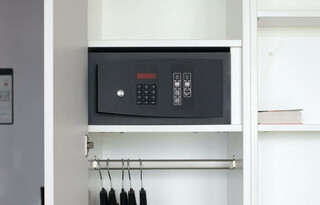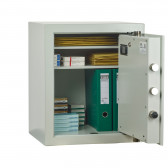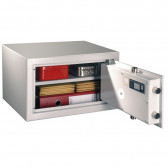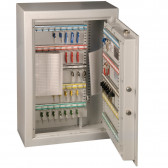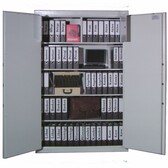On a site such as this you will find countless guides advising you to buy a home or business safe, discussing safes designed to store cash, jewellery, watches or other valuables, outlining the products on offer, there is even something about an online shop. Today we will take a different approach and focus on how buying a safe can turn against you, failing to solve key problems, instead causing new ones. I'll be citing real-life examples without mercy, so it'll be fun. I invite you to read on.
A poorly defined need
The first mistake that can be made is to incorrectly define why you need a home safe in the first place and what benefit you want to derive from having one.
As a general rule, the purpose of purchasing a home safe is to ensure the security of valuables, cash or jewellery. This security means an effective barrier in case of fire and protection against burglary.
Meanwhile, many customers do not really know what they are looking for. On a number of occasions we have had visitors to the showroom who turn up, look around the display and, with a certain charming helplessness, ask for 'some sort of safe'. It was only the supportive questions we asked on the spot that steered customers in the direction of what they needed. It was not at all uncommon for customers to leave with nothing after a frank conversation; it would then turn out that the safe was not really needed at all, and the purchase of a safe in the form the customer had come up with was advised against by us.
The smallest possible safe
The desire to have a safe as small as possible sometimes reaches a level where the purchase of a safe misses the point. After all, under the aforementioned circumstances of a burglary or fire, what use is a cassette that has enough capacity to store a wallet and weighs no more than 10 kg?
Such devices, which some customers unblinkingly refer to as cassettes, offer absolutely no protection against burglary. A single sheet of steel, at best 3 mm thick, even bolted to the wall, will offer only a symbolic resistance. And it does not matter whether it is our safe or not. Physics has its laws and a determined man armed with a crowbar, hammer or fireman's axe can smoothly get inside in minutes.
So where do these ideas come from? The reason is that some customers treat a safe as a missing link in the interior of the house, a good way of filling an unnecessary niche or an idea for utilising a cupboard. Meanwhile, the essence of buying a safe is security and nothing else.
The lowest possible regular price
In a way, the next sin follows from the above. The regular price of a safe is important, but treating this feature as the only, or even the main, factor in a purchase decision is a big mistake. And it's not even about making the home safes you buy expensive, but about making the safe purchase an informed decision. The 100% regular price as a means of selection is a method befitting tenders put out by public entities, where the need for a safe is based on regulations, not on a real threat.
What is wrong with this? Well, maybe not the majority, but a significant proportion of customers are not able to quickly assess the difference between safes on the market quickly enough to make a correct evaluation of their quality/price ratio. The lowest price makes sense when we compare products with the same, or at least similar parameters, in exactly the same way as we choose a mobile phone, a laptop or a holiday trip.
Meanwhile, very often customers with a fairly wide choice of safes are guided by price and that's it. How many times have I heard that if two safes look the same, why the difference in price is 30% or more? Well, it is the interior that counts :-) We have such an example on offer: there are two models with almost identical dimensions and weight, one in class III, the other in class IV. The difference in price is considerable, and at first glance the difference is not visible. How many serious discussions have we had about them....
Find out if it is worth buying a safe from a supermarket?
Uncle Google
Unrestricted access to the goodness that is the Internet has resulted in a phenomenon that probably has its name in sociological circles already. When looking for answers to our questions, we unreflectively believe what search engine results tell us. Even today, reading this text, you are a victim of algorithms :-).
As a result, we have learnt to base much of our knowledge of the world solely on more or less well-functioning patterns and to make decisions on this basis. Relying on a search engine, we choose the perfect recipe for a mother-in-law's dinner, how to clean the dishwasher, the pub for the date of a lifetime, and even diagnose ourselves with diseases and find treatments.
Sometimes that's good, sometimes bad. In the case of safes – badly. Why? Buying a safe is, despite appearances to the contrary, a highly individual and also intimate affair. A safe is not a household appliance, like a washing machine or a mushroom dryer, but a device that is intended to protect your treasures from theft. You'll keep all sorts of things in there, from cash, valuables, jewellery or other valuable items through to important documents, including some business documents if you run a home-based business, to long guns. Home safes are therefore critical devices and the security provided by a safe cannot be an illusion. What does this have to do with a search engine? The algorithm will select you a safe whose lowest price will be left unmentioned, it will not do a grade comparison, it will not explain the difference, it will not advise where to install it.
What's out of sight is out of mind
There is a belief that home safes are best hidden so that they cannot be seen, and that hiding them behind a painting or under a carpet will effectively protect valuables, money or other valuable items inside the safe from theft.
This is not the case, at any rate not by definition. Places as obvious as the wall behind a painting we can basically ignore with silence. A burglar would be an exceptional partisan, who would be spared from ripping paintings off the walls by bussing around your flat.
So does it not make sense to install a safe in a concealed location? There is a point, but if you want to protect the contents of the safe from burglary, the burglar-proof class of the safe, its weight and the correct method of installation will provide security in the first place. If all is well in these fields, then the security of your valuables will be assured.
Delivery
Whether you are planning to buy a safe for your home or office, delivery is one of the most important aspects of the venture. What mistakes are most likely to occur here?
Maybe not the majority, but a large number of customers appreciate it when delivery and installation are carried out by us. The customer can then be sure that the appliance will be brought in smoothly, that both the safe and the house in which it is to be placed will be secured, and that no one will get hurt in the process at the end. We offer such services throughout Poland, usually on working days, although we can also carry out the lifting and installation of a strongbox at the weekend on special request.
However, it sometimes happens that factors such as fast delivery and overconfidence lead customers astray. In some cases, the customer has decided that the delivery will be carried out by a freight forwarding company and that he will carry out the lifting and installation himself. On the spot, however, it turned out that nothing was possible, that the situation was beyond their capabilities, or even that elements of the house or office had been damaged by the attempt to bring the safe in by themselves.
The second sin is the concealment or careless specification of the on-site installation conditions. In extreme cases, delivery cannot take place when it turns out that it is physically impossible to insert a strongbox of the given dimensions into the place indicated.
So what is a good safe purchase?
I've rambled on, now more specifically: what can you do to buy with sense? The choice of safes in our range is very wide, with numerous models available in various sizes: there are products such as small fireproof safes for built-in furniture, and there are metal cabinets in which you can store entire binders of company or top-secret documents. There are numerous nuances in which you can die miserably, differences between armoured cabinets and fireproof safes, some feature fast delivery and competitive prices, while others cost a fortune and no one in their right mind would buy one just to store a few watches.
And yet, it happens. Therefore, the best possible idea is a direct contact with an advisor who, like a cross between a doctor, lawyer and confessor, will listen to all the stories, advise and help. In this way, it is easiest to protect yourself from mistakes that will make the purchase of a safe a bad and pointless investment. You are welcome!
Check also: Choosing the perfect home safe: a mini-guide to security for your valuables
